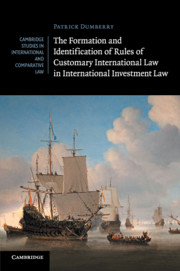Book contents
- Frontmatter
- Dedication
- Contents
- Foreword
- Preface
- Acknowledgments
- List of abbreviations
- Introduction
- 1 The concept of customary international law
- 2 Dancing with the sources: the fascinating story of the relative importance of custom and treaties at different times in the evolution of international investment law
- 3 State practice
- 4 Opinio juris
- 5 The fundamental importance of customary rules in international investment law
- General conclusion
- Bibliography
- Index
- cambridge studies in international and comparative law
4 - Opinio juris
Published online by Cambridge University Press: 05 May 2016
- Frontmatter
- Dedication
- Contents
- Foreword
- Preface
- Acknowledgments
- List of abbreviations
- Introduction
- 1 The concept of customary international law
- 2 Dancing with the sources: the fascinating story of the relative importance of custom and treaties at different times in the evolution of international investment law
- 3 State practice
- 4 Opinio juris
- 5 The fundamental importance of customary rules in international investment law
- General conclusion
- Bibliography
- Index
- cambridge studies in international and comparative law
Summary
Introduction
As mentioned in Chapter 3, under Article 38(1)b of the Statute of the International Court of Justice (ICJ), the formation of a rule of ‘international custom’ requires ‘general practice’ by States for it to be ‘accepted as law’. This fourth chapter examines the second requirement that must be demonstrated in order to prove the existence of a customary rule: a State's opinio juris.
The definition, the nature and the function of the opinio juris requirement raise some of the most controversial questions in international law. According to Thirlway, this question ‘has probably caused more academic controversy than all the actual contested claims made by States on the basis of alleged custom, put together’. The ILA has also noted that ‘in the real world of diplomacy’, these questions regarding the subjective element in customary international law ‘may be less problematic than in the groves of Academe’. The present author does not intend to examine the different and contradictory theories put forward by scholars surrounding the somewhat ‘mysterious’ subjective requirement of opinio juris. Moreover, I do not claim to have my own theory on the matter. As explained by ILC Special Rapporteur Wood, the ‘theoretical torment which may accompany’ the controversial question of the opinio juris requirement ‘in the books has rarely impeded its application in practice’. This is especially true in the context of investor-State arbitration disputes where the opinio juris requirement has only played a minimal role. For this reason, the goal of this chapter is twofold. I will first explain the nature and function of the opinio juris requirement under international law (Section 4.1). The second section will examine how the opinio juris requirement has been interpreted by scholars and effectively applied by tribunals in investor-State arbitration (Section 4.2).
Opinio juris under international law
This first section will examine the nature and function of the opinio juris requirement under international law. I will begin by observing that while opinio juris is a well-recognized requirement, it nevertheless remains difficult to assess in practical terms (Section 4.1.1). I will then briefly examine some of the controversial questions that have been debated by scholars, including whether or not this requirement is relevant to demonstrate the existence of customary norms (Section 4.1.2). Another theoretical question explored in this section is the so-called chronological paradox regarding how custom rules emerge (Section 4.1.3).
- Type
- Chapter
- Information
- The Formation and Identification of Rules of Customary International Law in International Investment Law , pp. 292 - 350Publisher: Cambridge University PressPrint publication year: 2016

